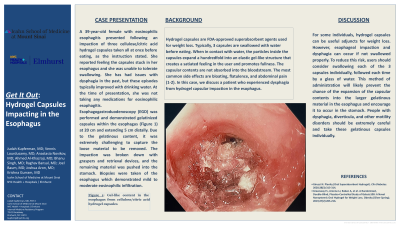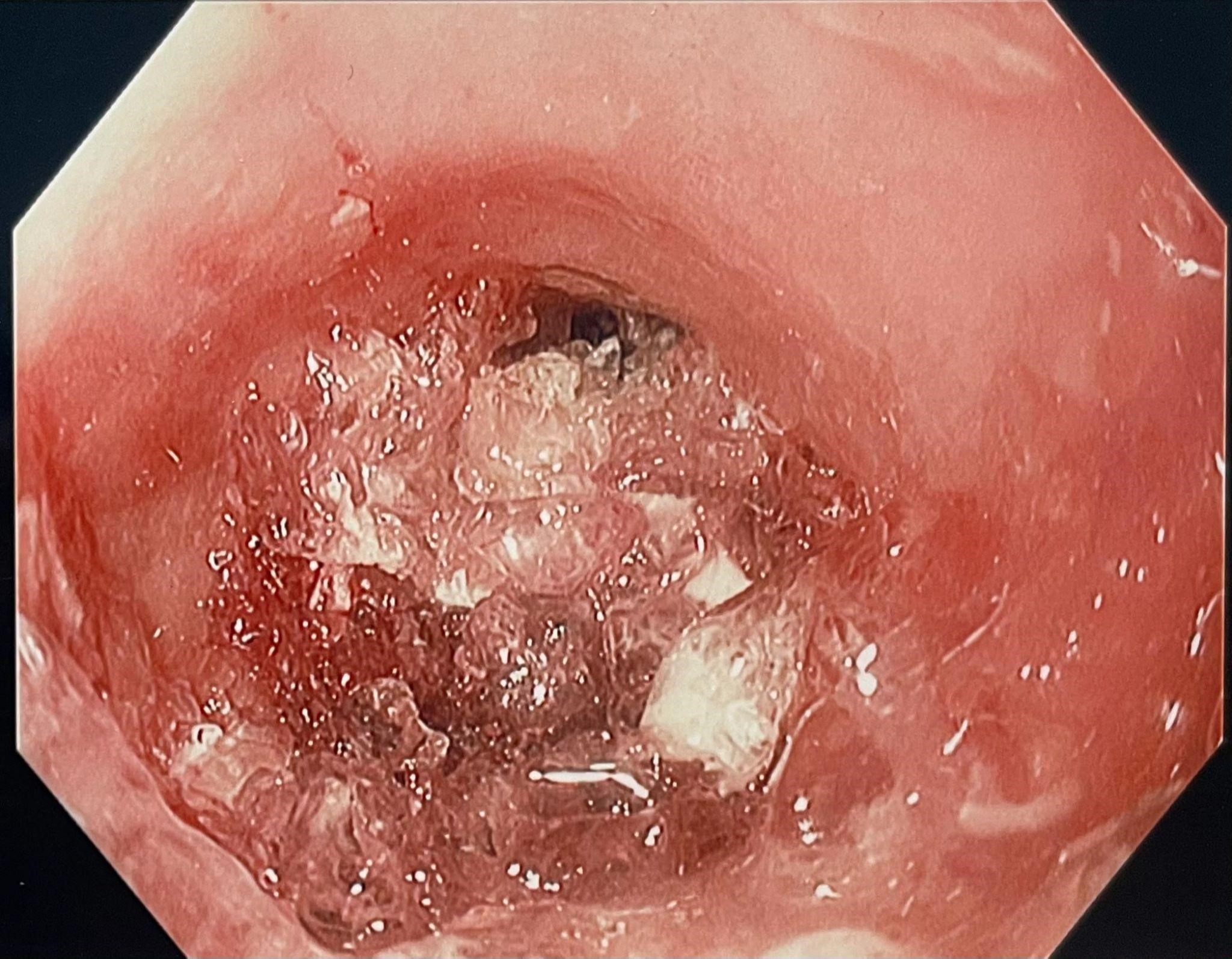Back


Poster Session A - Sunday Afternoon
Category: Esophagus
A0206 - Get It Out: Hydrogel Capsules Impacting in the Esophagus
Sunday, October 23, 2022
5:00 PM – 7:00 PM ET
Location: Crown Ballroom

Has Audio

Judah Kupferman, MD
Icahn School of Medicine at Mount Sinai, NYC Health + Hospitals/Elmhurst
Elmhurst, NY
Presenting Author(s)
Judah Kupferman, MD, Vennis Lourdusamy, MD, Anastasia Novikov, MD, Joshua Aron, MD, Aaron Walfish, MD, Raghav Bansal, MD, Joel Baum, MD, Ahmed Al-Khazraji, MD, Bhanu Singh, MD, Krishna Gurram, MD
Icahn School of Medicine at Mount Sinai, NYC Health + Hospitals/Elmhurst, Elmhurst, NY
Introduction: Hydrogel capsules are FDA-approved superabsorbent agents used for weight loss. Typically, 3 capsules are swallowed with water before eating. When in contact with water, the particles inside the capsules expand a hundredfold into an elastic gel-like structure that creates a satiated feeling in the user and promotes fullness. The capsular contents are not absorbed into the bloodstream. The most common side effects are bloating, flatulence, and abdominal pain (1-2). In this case, we discuss a patient who experienced dysphagia from pill impaction in the esophagus.
Case Description/Methods: A 39-year-old female with eosinophilic esophagitis (EoE) presented following impaction of three cellulose/citric acid hydrogel capsules taken all at once before eating as the instructions stated. She reported feeling the capsules stuck in her esophagus and she was unable to tolerate swallowing. She has had issues with dysphagia in the past, but these episodes typically improved with drinking water. At the time of presentation, she was not taking any medications for EoE. Esophagogastroduodenoscopy (EGD) was performed and demonstrated gelatinized capsules within the esophagus (Figure 1) at 20 cm and extending 5 cm distally. The impaction was broken down with graspers and retrieval devices, and the remaining material was pushed into the stomach. Due to the gelatinous content, it was extremely challenging to capture the loose material to be removed. Biopsies were taken of the esophagus which demonstrated mild to moderate eosinophilic infiltration.
Discussion: For some individuals, hydrogel capsules can be useful adjuncts for weight loss. However, esophageal impaction and dysphagia can occur if not swallowed properly. To reduce this risk, users should consider swallowing each of the 3 capsules individually, followed each time by a glass of water. This method of administration will likely prevent the chance of the expansion of the capsular contents into the larger gelatinous material in the esophagus and encourage it to occur in the stomach. People with dysphagia, diverticula, and other motility disorders should be extremely careful and take these gelatinous capsules individually.
1. Giruzzi N. Plenity (Oral Superabsorbent Hydrogel). Clin Diabetes. 2020;38(3):313-314.
2. Greenway FL, Aronne LJ, Raben A, et al. A Randomized, Double-Blind, Placebo-Controlled Study of Gelesis100: A Novel Nonsystemic Oral Hydrogel for Weight Loss. Obesity (Silver Spring). 2019;27(2):205-216.

Disclosures:
Judah Kupferman, MD, Vennis Lourdusamy, MD, Anastasia Novikov, MD, Joshua Aron, MD, Aaron Walfish, MD, Raghav Bansal, MD, Joel Baum, MD, Ahmed Al-Khazraji, MD, Bhanu Singh, MD, Krishna Gurram, MD. A0206 - Get It Out: Hydrogel Capsules Impacting in the Esophagus, ACG 2022 Annual Scientific Meeting Abstracts. Charlotte, NC: American College of Gastroenterology.
Icahn School of Medicine at Mount Sinai, NYC Health + Hospitals/Elmhurst, Elmhurst, NY
Introduction: Hydrogel capsules are FDA-approved superabsorbent agents used for weight loss. Typically, 3 capsules are swallowed with water before eating. When in contact with water, the particles inside the capsules expand a hundredfold into an elastic gel-like structure that creates a satiated feeling in the user and promotes fullness. The capsular contents are not absorbed into the bloodstream. The most common side effects are bloating, flatulence, and abdominal pain (1-2). In this case, we discuss a patient who experienced dysphagia from pill impaction in the esophagus.
Case Description/Methods: A 39-year-old female with eosinophilic esophagitis (EoE) presented following impaction of three cellulose/citric acid hydrogel capsules taken all at once before eating as the instructions stated. She reported feeling the capsules stuck in her esophagus and she was unable to tolerate swallowing. She has had issues with dysphagia in the past, but these episodes typically improved with drinking water. At the time of presentation, she was not taking any medications for EoE. Esophagogastroduodenoscopy (EGD) was performed and demonstrated gelatinized capsules within the esophagus (Figure 1) at 20 cm and extending 5 cm distally. The impaction was broken down with graspers and retrieval devices, and the remaining material was pushed into the stomach. Due to the gelatinous content, it was extremely challenging to capture the loose material to be removed. Biopsies were taken of the esophagus which demonstrated mild to moderate eosinophilic infiltration.
Discussion: For some individuals, hydrogel capsules can be useful adjuncts for weight loss. However, esophageal impaction and dysphagia can occur if not swallowed properly. To reduce this risk, users should consider swallowing each of the 3 capsules individually, followed each time by a glass of water. This method of administration will likely prevent the chance of the expansion of the capsular contents into the larger gelatinous material in the esophagus and encourage it to occur in the stomach. People with dysphagia, diverticula, and other motility disorders should be extremely careful and take these gelatinous capsules individually.
1. Giruzzi N. Plenity (Oral Superabsorbent Hydrogel). Clin Diabetes. 2020;38(3):313-314.
2. Greenway FL, Aronne LJ, Raben A, et al. A Randomized, Double-Blind, Placebo-Controlled Study of Gelesis100: A Novel Nonsystemic Oral Hydrogel for Weight Loss. Obesity (Silver Spring). 2019;27(2):205-216.

Figure: Figure 1: Gel-like content in the esophagus from cellulose/citric acid hydrogel capsules
Disclosures:
Judah Kupferman indicated no relevant financial relationships.
Vennis Lourdusamy indicated no relevant financial relationships.
Anastasia Novikov indicated no relevant financial relationships.
Joshua Aron indicated no relevant financial relationships.
Aaron Walfish indicated no relevant financial relationships.
Raghav Bansal indicated no relevant financial relationships.
Joel Baum indicated no relevant financial relationships.
Ahmed Al-Khazraji indicated no relevant financial relationships.
Bhanu Singh indicated no relevant financial relationships.
Krishna Gurram indicated no relevant financial relationships.
Judah Kupferman, MD, Vennis Lourdusamy, MD, Anastasia Novikov, MD, Joshua Aron, MD, Aaron Walfish, MD, Raghav Bansal, MD, Joel Baum, MD, Ahmed Al-Khazraji, MD, Bhanu Singh, MD, Krishna Gurram, MD. A0206 - Get It Out: Hydrogel Capsules Impacting in the Esophagus, ACG 2022 Annual Scientific Meeting Abstracts. Charlotte, NC: American College of Gastroenterology.
